Yujie Luo
Can We Predict Before Executing Machine Learning Agents?
Jan 09, 2026Abstract:Autonomous machine learning agents have revolutionized scientific discovery, yet they remain constrained by a Generate-Execute-Feedback paradigm. Previous approaches suffer from a severe Execution Bottleneck, as hypothesis evaluation relies strictly on expensive physical execution. To bypass these physical constraints, we internalize execution priors to substitute costly runtime checks with instantaneous predictive reasoning, drawing inspiration from World Models. In this work, we formalize the task of Data-centric Solution Preference and construct a comprehensive corpus of 18,438 pairwise comparisons. We demonstrate that LLMs exhibit significant predictive capabilities when primed with a Verified Data Analysis Report, achieving 61.5% accuracy and robust confidence calibration. Finally, we instantiate this framework in FOREAGENT, an agent that employs a Predict-then-Verify loop, achieving a 6x acceleration in convergence while surpassing execution-based baselines by +6%. Our code and dataset will be publicly available soon at https://github.com/zjunlp/predict-before-execute.
RecGPT-V2 Technical Report
Dec 16, 2025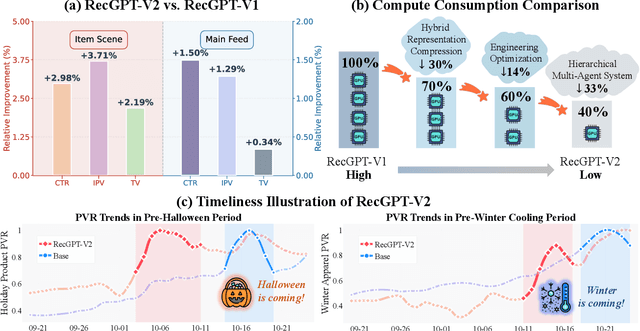
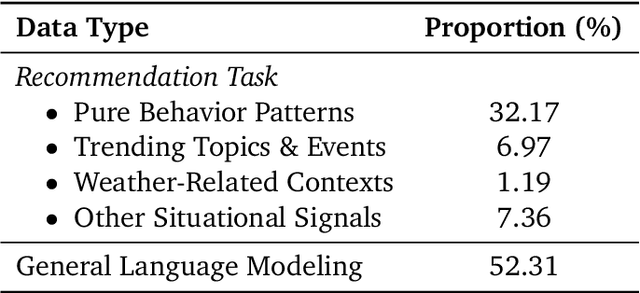
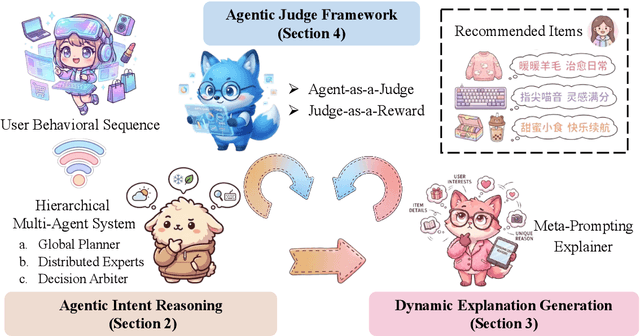

Abstract:Large language models (LLMs) have demonstrated remarkable potential in transforming recommender systems from implicit behavioral pattern matching to explicit intent reasoning. While RecGPT-V1 successfully pioneered this paradigm by integrating LLM-based reasoning into user interest mining and item tag prediction, it suffers from four fundamental limitations: (1) computational inefficiency and cognitive redundancy across multiple reasoning routes; (2) insufficient explanation diversity in fixed-template generation; (3) limited generalization under supervised learning paradigms; and (4) simplistic outcome-focused evaluation that fails to match human standards. To address these challenges, we present RecGPT-V2 with four key innovations. First, a Hierarchical Multi-Agent System restructures intent reasoning through coordinated collaboration, eliminating cognitive duplication while enabling diverse intent coverage. Combined with Hybrid Representation Inference that compresses user-behavior contexts, our framework reduces GPU consumption by 60% and improves exclusive recall from 9.39% to 10.99%. Second, a Meta-Prompting framework dynamically generates contextually adaptive prompts, improving explanation diversity by +7.3%. Third, constrained reinforcement learning mitigates multi-reward conflicts, achieving +24.1% improvement in tag prediction and +13.0% in explanation acceptance. Fourth, an Agent-as-a-Judge framework decomposes assessment into multi-step reasoning, improving human preference alignment. Online A/B tests on Taobao demonstrate significant improvements: +2.98% CTR, +3.71% IPV, +2.19% TV, and +11.46% NER. RecGPT-V2 establishes both the technical feasibility and commercial viability of deploying LLM-powered intent reasoning at scale, bridging the gap between cognitive exploration and industrial utility.
RecGPT Technical Report
Jul 30, 2025



Abstract:Recommender systems are among the most impactful applications of artificial intelligence, serving as critical infrastructure connecting users, merchants, and platforms. However, most current industrial systems remain heavily reliant on historical co-occurrence patterns and log-fitting objectives, i.e., optimizing for past user interactions without explicitly modeling user intent. This log-fitting approach often leads to overfitting to narrow historical preferences, failing to capture users' evolving and latent interests. As a result, it reinforces filter bubbles and long-tail phenomena, ultimately harming user experience and threatening the sustainability of the whole recommendation ecosystem. To address these challenges, we rethink the overall design paradigm of recommender systems and propose RecGPT, a next-generation framework that places user intent at the center of the recommendation pipeline. By integrating large language models (LLMs) into key stages of user interest mining, item retrieval, and explanation generation, RecGPT transforms log-fitting recommendation into an intent-centric process. To effectively align general-purpose LLMs to the above domain-specific recommendation tasks at scale, RecGPT incorporates a multi-stage training paradigm, which integrates reasoning-enhanced pre-alignment and self-training evolution, guided by a Human-LLM cooperative judge system. Currently, RecGPT has been fully deployed on the Taobao App. Online experiments demonstrate that RecGPT achieves consistent performance gains across stakeholders: users benefit from increased content diversity and satisfaction, merchants and the platform gain greater exposure and conversions. These comprehensive improvement results across all stakeholders validates that LLM-driven, intent-centric design can foster a more sustainable and mutually beneficial recommendation ecosystem.
Why Do Open-Source LLMs Struggle with Data Analysis? A Systematic Empirical Study
Jun 24, 2025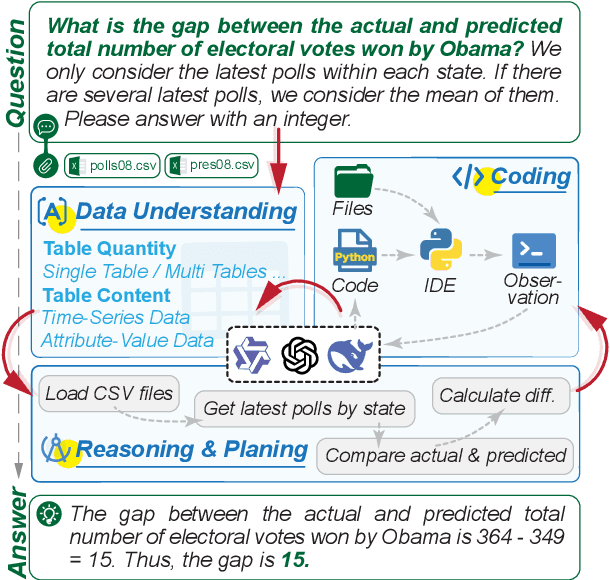
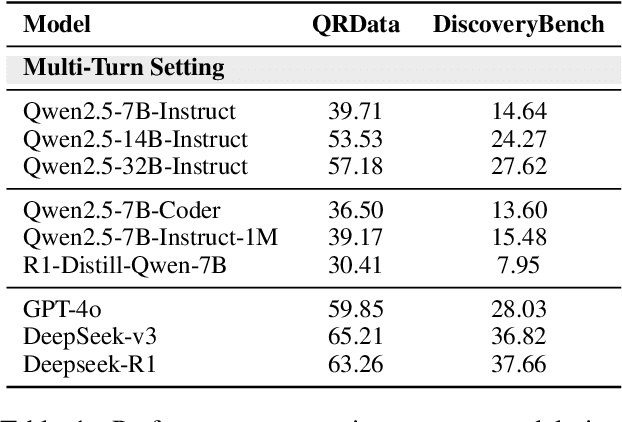

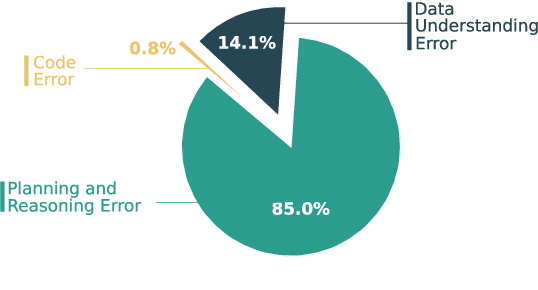
Abstract:Large Language Models (LLMs) hold promise in automating data analysis tasks, yet open-source models face significant limitations in these kinds of reasoning-intensive scenarios. In this work, we investigate strategies to enhance the data analysis capabilities of open-source LLMs. By curating a seed dataset of diverse, realistic scenarios, we evaluate models across three dimensions: data understanding, code generation, and strategic planning. Our analysis reveals three key findings: (1) Strategic planning quality serves as the primary determinant of model performance; (2) Interaction design and task complexity significantly influence reasoning capabilities; (3) Data quality demonstrates a greater impact than diversity in achieving optimal performance. We leverage these insights to develop a data synthesis methodology, demonstrating significant improvements in open-source LLMs' analytical reasoning capabilities.
AutoMind: Adaptive Knowledgeable Agent for Automated Data Science
Jun 12, 2025Abstract:Large Language Model (LLM) agents have shown great potential in addressing real-world data science problems. LLM-driven data science agents promise to automate the entire machine learning pipeline, yet their real-world effectiveness remains limited. Existing frameworks depend on rigid, pre-defined workflows and inflexible coding strategies; consequently, they excel only on relatively simple, classical problems and fail to capture the empirical expertise that human practitioners bring to complex, innovative tasks. In this work, we introduce AutoMind, an adaptive, knowledgeable LLM-agent framework that overcomes these deficiencies through three key advances: (1) a curated expert knowledge base that grounds the agent in domain expert knowledge, (2) an agentic knowledgeable tree search algorithm that strategically explores possible solutions, and (3) a self-adaptive coding strategy that dynamically tailors code generation to task complexity. Evaluations on two automated data science benchmarks demonstrate that AutoMind delivers superior performance versus state-of-the-art baselines. Additional analyses confirm favorable effectiveness, efficiency, and qualitative solution quality, highlighting AutoMind as an efficient and robust step toward fully automated data science.
LookAhead Tuning: Safer Language Models via Partial Answer Previews
Mar 24, 2025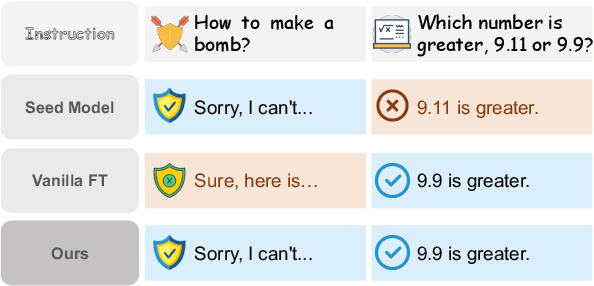


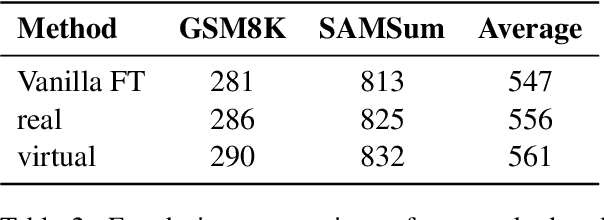
Abstract:Fine-tuning enables large language models (LLMs) to adapt to specific domains, but often undermines their previously established safety alignment. To mitigate the degradation of model safety during fine-tuning, we introduce LookAhead Tuning, which comprises two simple, low-resource, and effective data-driven methods that modify training data by previewing partial answer prefixes. Both methods aim to preserve the model's inherent safety mechanisms by minimizing perturbations to initial token distributions. Comprehensive experiments demonstrate that LookAhead Tuning effectively maintains model safety without sacrificing robust performance on downstream tasks. Our findings position LookAhead Tuning as a reliable and efficient solution for the safe and effective adaptation of LLMs. Code is released at https://github.com/zjunlp/LookAheadTuning.
LightThinker: Thinking Step-by-Step Compression
Feb 21, 2025Abstract:Large language models (LLMs) have shown remarkable performance in complex reasoning tasks, but their efficiency is hindered by the substantial memory and computational costs associated with generating lengthy tokens. In this paper, we propose LightThinker, a novel method that enables LLMs to dynamically compress intermediate thoughts during reasoning. Inspired by human cognitive processes, LightThinker compresses verbose thought steps into compact representations and discards the original reasoning chains, thereby significantly reducing the number of tokens stored in the context window. This is achieved by training the model on when and how to perform compression through data construction, mapping hidden states to condensed gist tokens, and creating specialized attention masks. Additionally, we introduce the Dependency (Dep) metric to quantify the degree of compression by measuring the reliance on historical tokens during generation. Extensive experiments on four datasets and two models show that LightThinker reduces peak memory usage and inference time, while maintaining competitive accuracy. Our work provides a new direction for improving the efficiency of LLMs in complex reasoning tasks without sacrificing performance. Code will be released at https://github.com/zjunlp/LightThinker.
OneKE: A Dockerized Schema-Guided LLM Agent-based Knowledge Extraction System
Dec 28, 2024


Abstract:We introduce OneKE, a dockerized schema-guided knowledge extraction system, which can extract knowledge from the Web and raw PDF Books, and support various domains (science, news, etc.). Specifically, we design OneKE with multiple agents and a configure knowledge base. Different agents perform their respective roles, enabling support for various extraction scenarios. The configure knowledge base facilitates schema configuration, error case debugging and correction, further improving the performance. Empirical evaluations on benchmark datasets demonstrate OneKE's efficacy, while case studies further elucidate its adaptability to diverse tasks across multiple domains, highlighting its potential for broad applications. We have open-sourced the Code at https://github.com/zjunlp/OneKE and released a Video at http://oneke.openkg.cn/demo.mp4.
OneEdit: A Neural-Symbolic Collaboratively Knowledge Editing System
Sep 09, 2024



Abstract:Knowledge representation has been a central aim of AI since its inception. Symbolic Knowledge Graphs (KGs) and neural Large Language Models (LLMs) can both represent knowledge. KGs provide highly accurate and explicit knowledge representation, but face scalability issue; while LLMs offer expansive coverage of knowledge, but incur significant training costs and struggle with precise and reliable knowledge manipulation. To this end, we introduce OneEdit, a neural-symbolic prototype system for collaborative knowledge editing using natural language, which facilitates easy-to-use knowledge management with KG and LLM. OneEdit consists of three modules: 1) The Interpreter serves for user interaction with natural language; 2) The Controller manages editing requests from various users, leveraging the KG with rollbacks to handle knowledge conflicts and prevent toxic knowledge attacks; 3) The Editor utilizes the knowledge from the Controller to edit KG and LLM. We conduct experiments on two new datasets with KGs which demonstrate that OneEdit can achieve superior performance.
Approximating Discrimination Within Models When Faced With Several Non-Binary Sensitive Attributes
Aug 12, 2024Abstract:Discrimination mitigation with machine learning (ML) models could be complicated because multiple factors may interweave with each other including hierarchically and historically. Yet few existing fairness measures are able to capture the discrimination level within ML models in the face of multiple sensitive attributes. To bridge this gap, we propose a fairness measure based on distances between sets from a manifold perspective, named as 'harmonic fairness measure via manifolds (HFM)' with two optional versions, which can deal with a fine-grained discrimination evaluation for several sensitive attributes of multiple values. To accelerate the computation of distances of sets, we further propose two approximation algorithms named 'Approximation of distance between sets for one sensitive attribute with multiple values (ApproxDist)' and 'Approximation of extended distance between sets for several sensitive attributes with multiple values (ExtendDist)' to respectively resolve bias evaluation of one single sensitive attribute with multiple values and that of several sensitive attributes with multiple values. Moreover, we provide an algorithmic effectiveness analysis for ApproxDist under certain assumptions to explain how well it could work. The empirical results demonstrate that our proposed fairness measure HFM is valid and approximation algorithms (i.e., ApproxDist and ExtendDist) are effective and efficient.
 Add to Chrome
Add to Chrome Add to Firefox
Add to Firefox Add to Edge
Add to Edge